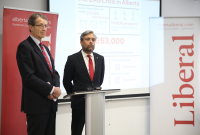Thank you for helping us meet our fundraising goal!
Green Leader Elizabeth May is warning that taxpayers across Canada could soon be forced to bail out Alberta’s oilpatch because of a failure to adequately manage billions of dollars worth of liabilities — a concern immediately dismissed by federal Natural Resources Minister Amarjeet Sohi.
May was reacting to revelations that Alberta’s fossil fuel industry regulator had privately estimated that the cost of cleaning up aging and inactive oil and gas exploration wells, facilities, pipelines and tailings ponds in the province could cost $260 billion — or $200 billion greater than a previous public estimate.
The Nov. 1 joint investigation by National Observer, Global News, the Toronto Star and StarMetro Calgary led to an apology by the Alberta Energy Regulator for the “concern and confusion” caused by its estimate. The organization then announced that its president would resign in January — a move it said had nothing to do with revelations about its oilpatch liability figures.
On Tuesday, Alberta's governing New Democrats and official Opposition United Conservatives prevented an emergency debate on the issue proposed by a Liberal MLA.
“Yes, the federal government is going to end up being responsible for some of that cleanup,” said May in an interview Wednesday, following remarks she gave at a biotechnology conference in downtown Ottawa.
“Right now all Canadians should know that we have a very heavy debt load that we’re carrying on behalf of the oil industry, because they won’t be paying off their cleanup costs.”
Speaking on Parliament Hill after a caucus meeting, Sohi told National Observer that companies are responsible for cleaning up their environmental destruction — and provinces are responsible for holding those companies accountable.
“This is a report that was generated by the regulator in Alberta...it is a liability that the oil industry is responsible for, and it’s a liability that a provincial government manages, or asks companies in Alberta to manage,” he said.

Feds gave millions for Sydney Tar Ponds cleanup
May argued that the federal government had already spent hundreds of millions of dollars for an environmental cleanup of a provincial installation — the Sydney Tar Ponds on Cape Breton Island, which she called one of the country’s worst toxic waste sites.
Toxic sludge had flowed into an estuary into the harbour of Sydney, N.S., the byproducts of a steel plant that ha been bought by the Nova Scotia government. In 2001, May — at the time the executive director of the Sierra Club of Canada — went on a 17-day hunger strike to demand relocation of residents away from toxins in a Sydney neighbourhood.
Six years later, the federal government committed $280 million to a joint $400-million fund with Nova Scotia to clean up the mess. May said it was a recognition of Ottawa’s responsibility — even though it was much smaller than the size of operations in Alberta’s oilpatch.
“That’s one estuary on Cape Breton Island — a fraction of the size of the tailings ponds the oilsands are creating,” she said. “So yes, we’re all going to end up paying for the cleanup.”
Asked about whether the Sydney Tar Ponds set a precedent for federal government investment in environmental cleanups, Sohi said “I don’t know the specifics of the project that you are mentioning,” and reiterated his stance on provincial responsibility.
“It is my understanding that companies are responsible for making sure that they have plans in place to mitigate the damage that is done to the environment,” he said, “and it’s the province’s responsibility to make sure that when these resources are extracted, companies are held responsible to pay for the costs of remediation and cleanup that has to occur afterwards.”
The federal government has already chipped in some money to help Alberta clean up abandoned wells. In its 2017 federal budget, the Trudeau government offered $30 million in support for the oilpatch, including funding to support reclamation of orphaned wells. An orphan well is an inactive site that no longer has an operator due to bankruptcy.
“While this important task remains with the province, we have been at the table with our support,” Sohi’s spokeswoman Vanessa Adams told Global News, National Observer and the Toronto Star in an email on Oct. 30.
'1.5 degrees is a lot worse than we thought'
At the biotechnology conference, called Scaling Up 2018: Competing in the Global Bioeconomy Market, May gave a speech highlighting the UN Intergovernmental Panel on Climate Change (IPCC)’s recent report.
The IPCC said there is only 10 to 12 years left to keep global average temperature rise to a maximum of 1.5 Celsius above pre-industrial levels, in order to avoid a severe increase in the risk of drought, floods and other disasters, and a spike in poverty for hundreds of millions of people.
The world has already hit one degree of global average temperature increase since the industrial revolution, May noted, and "we know what it looks like now” — the nightly news talking about the latest in extreme weather. But the IPCC report showed "1.5 degrees is a lot worse than we thought,” she said.
"Somewhere between 1.5 and two, there’s a danger of crossing a big red line in the atmosphere," said May, where warming feedback loops will kick in, such as when the Arctic permafrost thaws and releases huge stores of methane into the atmosphere.
This oilsands industry is Canada's fastest growing source of greenhouse gas emissions, according to the federal government. But the current Alberta NDP government introduced a climate change plan in 2015 that would cap the industry's overall annual pollution to a level that would be about 40 per cent higher.
May noted that the sector, which extracts heavy oil from tar-like bituminous deposits of sand beneath Alberta's boreal forest, has been heavily subsidized ever since former prime minister Jean Chrétien's Liberal government offered billions of dollars in incentives, starting in the 1990s.
She said the cost of liabilities would dramatically rise if governments continue to allow the industry to expand. She suggested it would be better to maintain current levels of production, refining the product in Alberta and cancelling new pipeline expansion projects to reduce carbon pollution.






Comments
It'll never be cleaned up by us. Our species will be extinct before we ever get around to that. Geological forces will clean it up over the course of the next million+ years.
Yes, greed will eventually rid the planet of a most disruptive life form. Sad.
Right on, Ms. May, and the oil sands is only the most obvious problem. Multi-stage, high pressure horizontal fracking is everywhere in Alberta. Banned in more enlightened jurisdictions, the effects of this practice go far beyond those acknowledged by industry and government. Add the damage to health, environment and the economy caused by fracking and the total we will all pay is even higher.
The best kept secret in Alberta...until the 2015 election, when news of what was hiding in the back country began to become public knowledge. Shameful pandering to oil companies, perhaps under the mistaken belief that oil prices could only go up and so surely one day wells that were economic under present circumstances could become profitable again. Illustrates the limits of cockeyed optimism.......but however we slice it....
The public will be left holding the bag. Tax whiners should have got their noses into this boondoggle, if its public money they are really interested in husbanding.
May is undoubtedly correct. You cannot squeeze blood out of a stone. If the company that owns the project or well has gone bankrupt, do you go to CEO and board directors and ask them to pay. I doubt it, but of course it would be the fair thing to do. The CEO and directors are the ones taking the chance of investment.